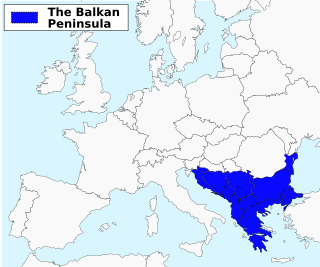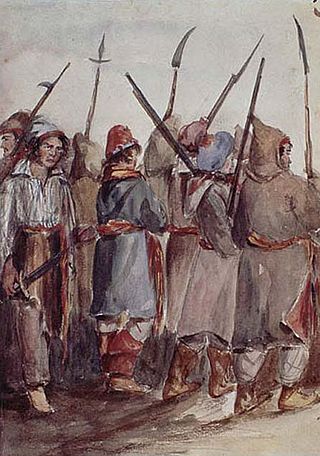
Austria-Hungary, often referred to as the Austro-Hungarian Empire or the Dual Monarchy, was a multi-national constitutional monarchy in Central Europe between 1867 and 1918. Austria-Hungary was a military and diplomatic alliance of two sovereign states with a single monarch who was titled both emperor of Austria and King of Hungary. Austria-Hungary constituted the last phase in the constitutional evolution of the Habsburg monarchy: it was formed with the Austro-Hungarian Compromise of 1867 in the aftermath of the Austro-Prussian War and was dissolved shortly after Hungary terminated the union with Austria on 31 October 1918.

The British Army is the principal land warfare force of the United Kingdom, a part of the British Armed Forces along with the Royal Navy and the Royal Air Force. As of 1 October 2023, the British Army comprises 75,983 regular full-time personnel, 4,097 Gurkhas, 26,546 volunteer reserve personnel and 4,548 "other personnel", for a total of 111,174.
Entente, meaning a diplomatic "understanding", may refer to a number of agreements:

The British Armed Forces are the military forces responsible for the defence of the United Kingdom, its Overseas Territories and the Crown Dependencies. They also promote the UK's wider interests, support international peacekeeping efforts and provide humanitarian aid.
The French and Indian Wars were a series of conflicts that occurred in North America between 1688 and 1763, some of which indirectly were related to the European dynastic wars. The title French and Indian War in the singular is used in the United States specifically for the warfare of 1754–63, which composed the North American theatre of the Seven Years' War and the aftermath of which led to the American Revolution. The French and Indian Wars were preceded by the Beaver Wars.
The military history of the United States spans over two centuries, the entire history of the United States. During those centuries, the United States evolved from a newly formed nation which fought for its independence from the Kingdom of Great Britain (1775–1783) to world superpower status in the aftermath of World War II to the present. As of 2021, the United States Armed Forces consists of the Army, Marine Corps, Navy, Air Force and Space Force, all under the command of the Department of Defense, and the Coast Guard, which is controlled by the Department of Homeland Security.
I Corps, 1st Corps, or First Corps may refer to:

The Balkans and parts of this area are alternatively situated in Southeastern, Southern, Eastern Europe and Central Europe. The distinct identity and fragmentation of the Balkans owes much to its common and often turbulent history regarding centuries of Ottoman conquest and to its very mountainous geography.
A commando is an elite light infantry or special forces soldier, trained for quick raid operations.

Irregular military is any non-standard military component that is distinct from a country's national armed forces. Being defined by exclusion, there is significant variance in what comes under the term. It can refer to the type of military organization, or to the type of tactics used. An irregular military organization is one which is not part of the regular army organization. Without standard military unit organization, various more general names are often used; such organizations may be called a troop, group, unit, column, band, or force. Irregulars are soldiers or warriors that are members of these organizations, or are members of special military units that employ irregular military tactics. This also applies to irregular infantry and irregular cavalry units.
Black Legion may refer to:

The Allies, formally referred to as the United Nations from 1942, were an international military coalition formed during World War II (1939–1945) to oppose the Axis powers. Its principal members by the end of 1941 were the "Big Four" - United Kingdom, United States, Soviet Union, and China.

The Allies, or the Entente Powers, were an international military coalition of countries led by France, the United Kingdom, Russia, the United States, Italy, and Japan against the Central Powers of Germany, Austria-Hungary, the Ottoman Empire, and Bulgaria in World War I (1914–1918).
18th Brigade may refer to:
Terms such as Serbian Volunteers, Serbian Volunteer Corps, Serbian Volunteer Division, Serbian Volunteer Force, Serbian Volunteer Guard, Serbian Volunteer Military, et cetera may refer to:
Territorial Defense or Territorial Defense Forces may refer to:

The Colonial Auxiliary Forces Officers' Decoration, post-nominal letters VD, was established in 1899 as recognition for long and meritorious service as a part-time commissioned officer in any of the organized military forces of the British Colonies, Dependencies and Protectorates. It superseded the Volunteer Officers' Decoration for India and the Colonies in all these territories, but not in the Indian Empire.
Long Service and Good Conduct Medal is a service medal awarded to personnel in various branches of the armed forces of the United Kingdom and the territories that are or were at some point a part of the British Empire or Commonwealth of Nations.

Imperial fortress was the designation given in the British Empire to four colonies that were located in strategic positions from each of which Royal Navy squadrons could control the surrounding regions and, between them, much of the planet.








